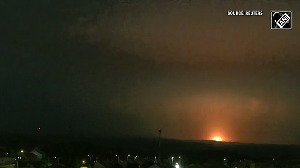Despite 14 suspected and four confirmed Severe Acute Respiratory Syndrome cases throughout India, the government is expressing confidence in its plans to check the dreaded disease.
"We are confident of India's capacity to check SARS. The strength of doctors at the airports has been increased, special disembarkation procedures are in practice and our laboratories have state-of-art diagnostic capability," Director General of Health Services Dr S P Agarwal said.
The Director of the National Institute of Communicable Diseases, Dr Shiv Lal, added that the NICD and the NIV were using World Health Organisation approved primers for conducting the SARS diagnostic tests. "We have the latest chemicals and technology used for SARS testing available with us."
The Union Health Minister, Sushma Swaraj, also made similar claims in Parliament on Tuesday. She said there was no need for panic and called for a meeting of the state health secretaries and directors with the central authorities in the capital on Thursday.
But there is more than that meets the eye in the government claims. That the meeting between the central and state health officials has been set up for Thursday does not inspire confidence in the government insistence that it is taking the disease seriously. Many health officials privately admit that 72 hours can be the difference between effective containment and a raging epidemic.
More importantly, the efforts the health ministry has made in the direction of educating doctors around the country leaves much to be desired. But the DGHS does not think so and says, "A meeting is being held in Mumbai with private practitioners and teachers of Mumbai and the newsletter that the National Institute of Communicable Diseases brings out covers SARS this time. Plus we have put out SARS related information on our website."
The DGHS's statement raises one important question, even if it doesn't allay the misgivings about the health ministry's efforts to combat SARS. Are a monthly newsletter and an official website enough to educate a country of billion and its doctors about SARS, the symptoms and precautions?
Further, the much talked about screening on the airports has also come under intense scrutiny as the four latest cases of suspected SARS infections were of individuals who had passed through the SARS checkpoints, but had to report to health authorities with symptoms akin to SARS infection only days after. For instance, the latest case in New Delhi is that of a 29-year-old Chinese woman who reached the capital from China by a Cathay Pacific flight early Monday morning. Though she made it through the checkpoints at the IGI Airport to her workplace at Gurgaon, Haryana, she reported to a private doctor only hours later, when she had cough.
"She has been admitted to the Infectious Diseases Hospital, where she is under isolation. But her symptoms do not follow the definition of SARS," Dr Agarwal claimed. Her samples, though, are yet to be tested by the NICD.
Similarly, in two other suspected SARS cases -- one from Nashik and another from Jaipur -- the health authorities claim that the persons are not infected with SARS, though the tests are yet to be done. The Jaipur suspect had come from New York on April 14 and reported his case on April 21 to a private doctor and was referred to the IDH, Jaipur. "His blood tests, chest X-rays are normal. Since some cases were reported from the US, he is still under observation," the DGHS said.
He added that the Nashik man suspected of SARS had come from Houston on April 14 and reported to a doctor on April 20 with symptoms of common cold and was admitted to the Nashik general hospital. "He too does not fall under SARS definition. The PCRA tests that we are doing are only supportive tests but we can say whether a patient falls under SARS or not on the basis of clinical tests," the DGHS insisted.
Meanwhile, 25 friends and relatives of the Pune family -- whose three members including the bride, Julie, got infected with SARS thanks to her infected brother Stanley D'Silva -- have been home quarantined. Since the marriage guests and the bridegroom knew about the bride and her family being SARS suspects and went ahead with the marriage, it raises concerns whether the SARS suspects who have been 'home quarantined' will not break the rules they are supposed to follow voluntarily.
Many are wondering whether India will declare SARS a 'notifiable disease'. According to the international health regulations, yellow fever, plague and Cholera are notifiable diseases and the government can legally enforce a person suspected to carry such a disease to stay within a limit or observe certain precautions. "We are considering that. No decision has been taken yet," Dr Agarwal said.





